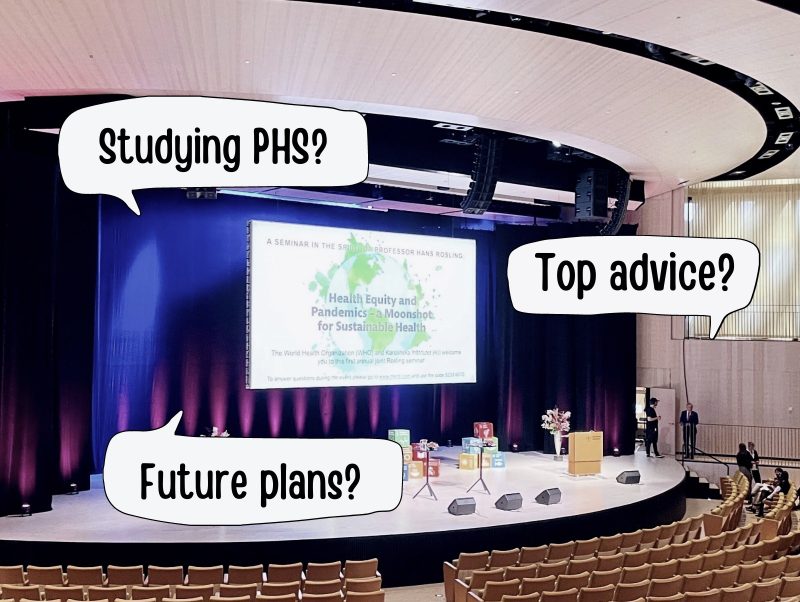
Interviewing Public Health Sciences – Epidemiology Students
If you’ve read my blog on the Public Health Sciences (PHS) Class of 2023, you hopefully got an overview of the demographics and backgrounds of this year’s cohort. Perhaps while reading more questions came up. You might be wondering why these students chose KI, what they have most enjoyed about the programme and living in Sweden or what their greatest challenges have been.
For this blog, I had the pleasure of interviewing three students from the Epidemiology track to answer these questions and more. In addition to providing a more personal insight into the lives of the incredible students who are studying public health, I hope this blog will highlight the diversity of the PHS programme and make you excited about the inspiring people you can meet at KI.
With no more delay, let me introduce you to Ha, Vera and Cecilia!
Ha is from Vietnam and just completed her medical degree in June. During her previous studies, Ha had the opportunity to work on a collaborative research project conducted by her university and KI. She became interested in epidemiology due to the increasing importance of evidence-based medicine and her desire to contribute to improving the health of people at a large scale through rigorous scientific research.
Vera has a bachelor’s degree in political science and began her career journey by starting to work at the Médecins Sans Frontiers (MSF) office in Stockholm. After going on to study journalism, she worked as a freelance journalist for 3 years and later for a women’s magazine, writing from a feminist angle on a variety of topics, including women’s health. Later, on a mission with MSF in Greece to assist refugees in transit camps, Vera became intrigued with epidemiology and studying the patterns that underly health distribution even among the most heterogeneous groups. Back in Stockholm, she worked in the social healthcare sector for 3 years, managing projects to help unaccompanied minors from Syria, Afghanistan and Eritrea. Then Vera became a mother and started studying in an online bachelor’s programme for public health shortly before coming to KI.
Cecilia, who is also a parent, is from Sweden and has been working as a child psychiatrist for 20 years. In addition to caring for patients with neuropsychiatric disorders, working in the specialized unit for PTSD and being a member of an expert panel for psychiatry addressing pharmacological issues, Cecilia has previously taught medical students specializing in psychiatry. Working as a physician, she began to recognise patterns among her patients, many of which are linked to the great inequalities that exist in our society. Her growing interest in the social determinants of health led her to want to study public health epidemiology.
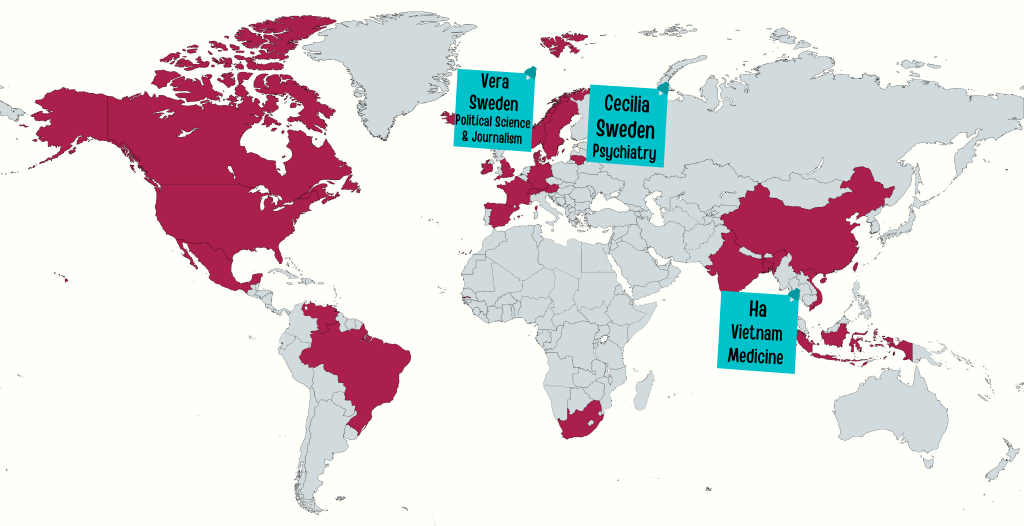
Was choosing to come to KI an easy decision?
Ha: Deciding to start a master’s programme right after finishing my bachelor’s in medicine was not easy. I had no full-time work experience and felt uncertain about my future and what area I wanted to focus on. I also thought that I didn’t know enough about myself in terms of my strengths and weaknesses. But, because I had the opportunity to work with KI on research projects before, I felt that KI would be a good university for me. KI was my first choice and the only university I applied to. As soon as I received the results, I knew that I would come to KI––and I never regretted it.
Vera: In Sweden, KI is a very reputable educational institution and I had heard a lot of good about the university and its research focus. But, since I hadn’t studied for several years, I didn’t know if KI would accept someone like me. Still, I decided to apply. Because I already have some work experience in the project management, implementation and evaluation aspects of public health, I chose the Epidemiology track.
Cecilia: I knew that I really wanted to develop a deeper understanding of the social determinants of health and thought that a master’s programme would be a very good opportunity to do that. I knew KI since I completed my basic educational training in medicine here. Based on my past experience, I felt that KI would be a great fit for me but I was unsure if I would get accepted.
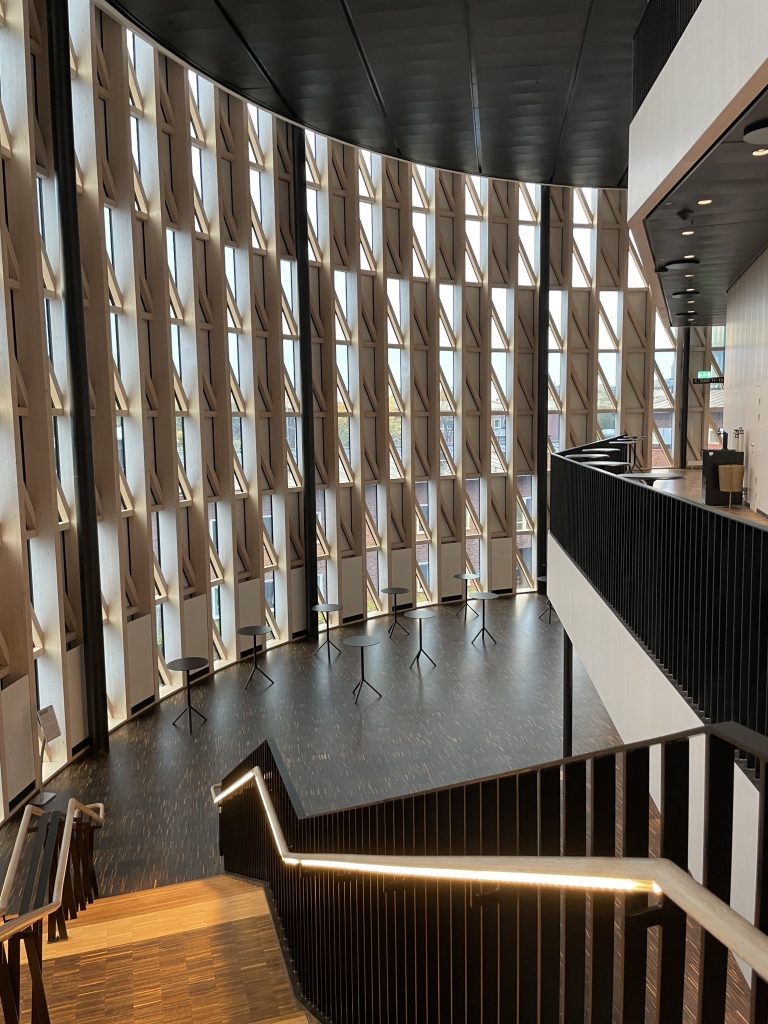
What has helped you succeed in the programme so far?
Ha: My background in medicine has been helpful as I have knowledge on the diseases we discuss and on how health systems work. I was also able to gain some experience in how to conduct a study and data analysis during my thesis. This has been helpful in biostatistics.
Vera: Just having a foot in one part of public health has been helpful. After hearing guest lecturers share about their fieldwork, I began to appreciate that my past work experience is valuable to the programme even if it might not be used directly. Having gained some experience in the field has also helped me include different perspectives when engaging with the coursework. On another note, statistics are kind of scary in some ways. But since I had taken almost a year of statistics in my bachelor’s, it wasn’t completely new to me so that helped me a bit.
Cecilia: I took some individual public health courses in the year before starting the master’s which has helped. But I don’t think that having studied public health before is crucial. What has helped as well is having quite some experience in working in different settings with people from various backgrounds. Working well together is important in our programme and I am very impressed by our class and how people come together from all of these different places to collaborate.
What has been your favourite part about the programme?
Ha: I really appreciate how approachable and friendly the professors are. We can ask any question without the fear of being judged and the lecturers take time to explain the concept until we fully understand it. I also enjoy how eager the students to engage in discussions because it really helps enhance our knowledge.
Vera: Having professors and guest lecturers with different backgrounds contributing to the course makes the teaching so much more interesting, dynamic and alive. The diverse perspectives that the professors and researchers bring help you notice that there is a bigger picture connected to what we are learning. KI is also very different from what I expected. I was surprised by how much the university feels like a community, creating an environment in which you want to stay on campus to have lunch with your peers or study. This makes me more motivated to be a part of KI.
Cecilia: All of the courses have been interesting in their own ways. I really enjoy that the classes offer different perspectives and later discovering how all of these pieces fit together.
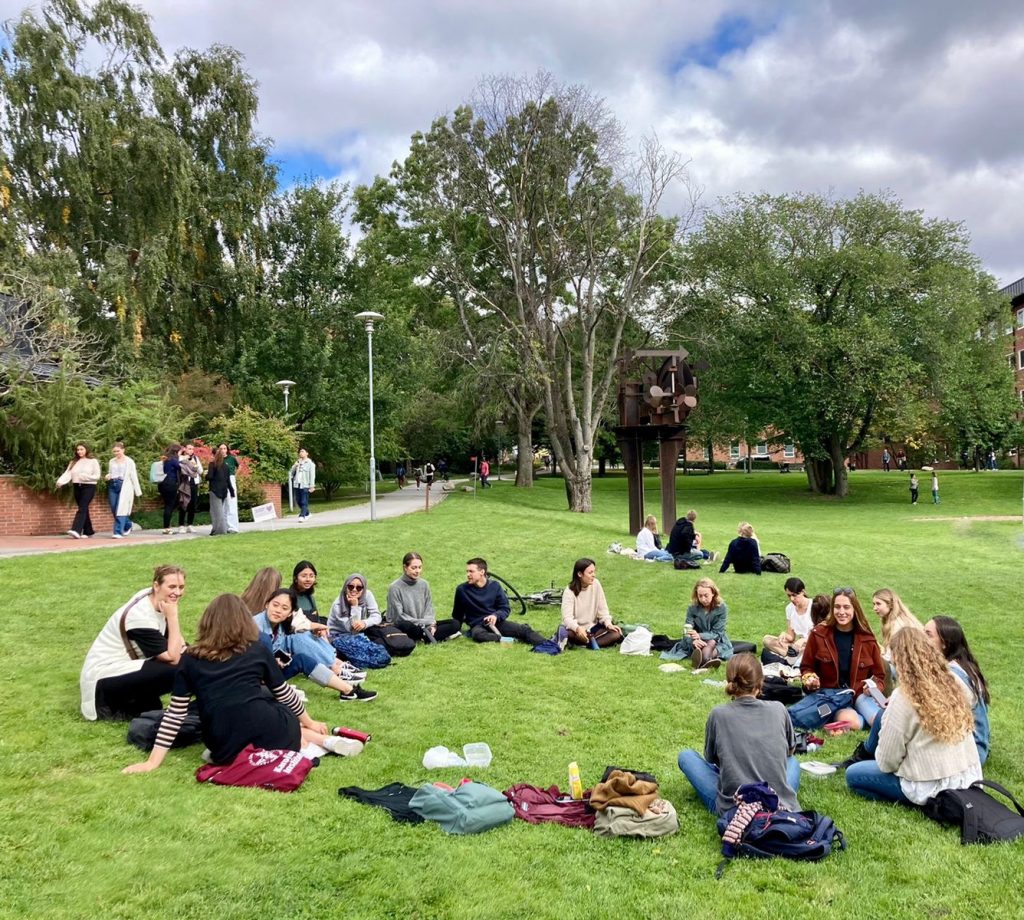
What has been your favourite part about living in Sweden?
Ha: I love the accessibility to nature. We have beautiful nature everywhere here in Sweden and in just 5 minutes I can walk to the lake which is great because I really enjoy studying outside.
Vera: When I lived in Paris during the past two years, I missed the closeness to nature and calm environments. So I really appreciate seeing forests and all of the greenery here in Sweden.
Cecilia: Since Sweden is my home country, I feel quite inexperienced in being able to compare it with other countries. However, one thing I really appreciate about Sweden are the opportunities that are available to women. Being a parent myself, I have always been able to work. My husband was able to take his paternity leave which made it possible that both partners can continue pursuing their careers while caring for their family.
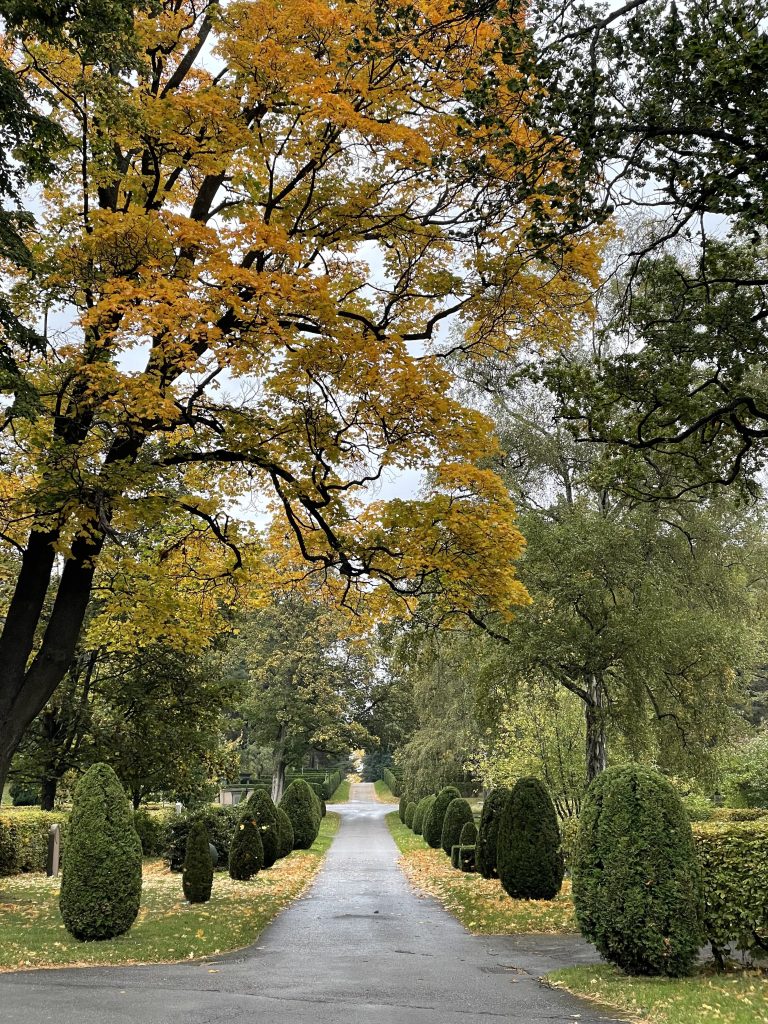
One of the parks close to campus. Image credit: Sarah Pechtl 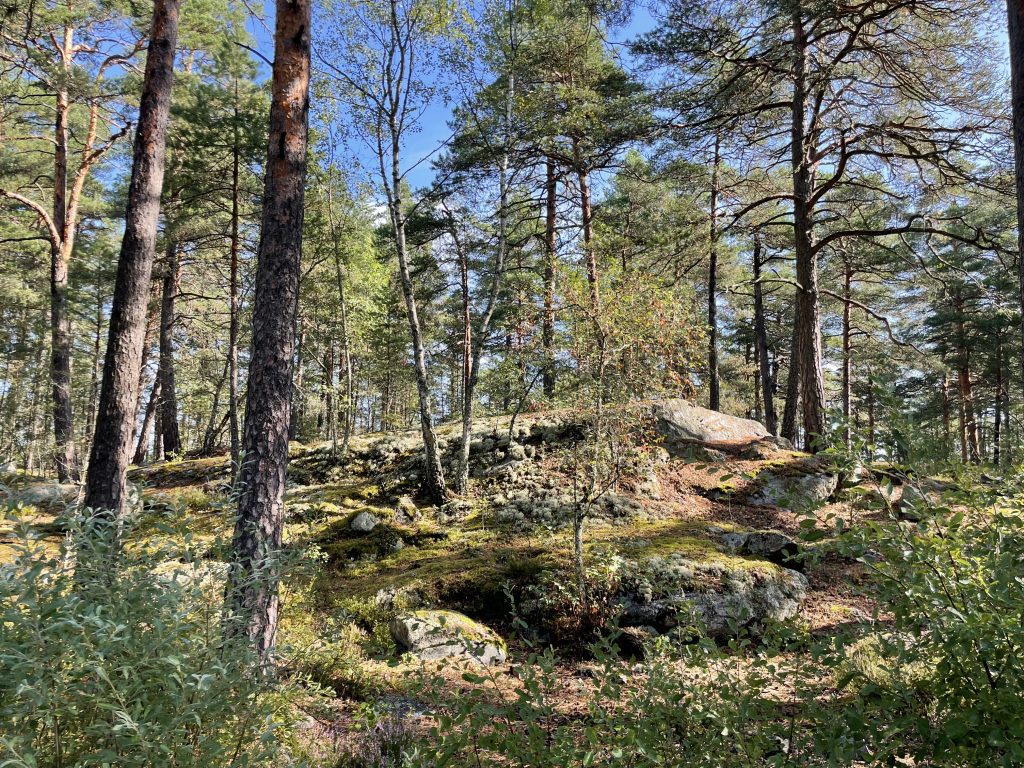
Stockholm has beautiful national parks perfect for weekend hikes. Image credit: Sarah Pechtl
What has been your biggest challenge so far?
Ha: This is not really a challenge but because our programme is so diverse, it takes some time and effort to know about everyone’s culture. The culture from other people’s countries can be very different from that of my country and it’s critical to be aware of these cultural differences to minimise misunderstandings. To really know people––not just on the surface but to truly get along with them––you need to understand the cultural background and worldview that shapes them.
Vera: What I have found most difficult is being confident in my abilities. I frequently find myself asking “Will I manage?” and I have this constant feeling of “Oh, it’s going to be so difficult”. However, the course leaders are aware of these worries and they reassure us. It is so important to not give up because of your confidence level.
Cecilia: Statistics. I really have to spend some time sorting things out in my head and making sure I fully understand the material. Stata [the statistics programme we learn in the master’s programme] can also be challenging at times.
Do you have any advice for individuals who are interested in the PHS programme?
Ha: Make sure you really understand what the programme can offer you. Think about whether the skills that the programme will teach you are the ones you will need in your future career. I would also suggest contacting the people who are studying in the programme you are interested in because what you experience in real life might be a bit different from what you see on social media. I reached out to a lecturer who works at KI to help get a better understanding of whether the programme is suitable for me.
Vera: Once you are at KI, attend all of the classes, listen to researchers from different areas and take advantage of everything KI and the programme offer you. There is so much going on and so many interesting people you can meet here. All of this stimulation really enhances the learning experience. And, of course, have fun!
Cecilia: I would encourage everyone who is interested to apply. Don’t hesitate or worry too much if you’ll get accepted. Just try!
After completing the master’s programme, what do you want to do next?
Ha: I’m not completely certain of what I want to do next. I think in the long-term I want to work in Vietnam in the healthcare system. The public health area I am really interested in is infectious diseases, particularly related to antibiotic resistance. If given the opportunity, I would also like to pursue a PhD. But I would want to work for a few years before to gain hands-on experience and learn more about myself.
Vera: I am definitely interested in conducting research for universities or governments using registry data, for example. However, I am not yet sure which research topics I would like to focus on. Migrant health is still a significant interest area for me. But now because of the programme, I am also getting exposed to these other really important topics, including climate change and women’s experiences. It is really fascinating to discover how everything is so interrelated.
Cecilia: My dream would be to be able to continue working as a clinician while also working on projects for the Stockholm region in a public health capacity. One issue that interests me greatly is the situation for young people in some of the disadvantaged areas in the Stockholm region. There is a massive need for support and getting the right kind of services for the affected communities.
I hope you enjoyed learning more about the people in the PHS – Epidemiology programme.
If you have any questions regarding what it is like to study at KI and live in Sweden, feel free to contact me at sarah.pechtl@stud.ki.se
– Sarah : )
Sarah Pechtl – Public Health Sciences, Health Promotion and Prevention
Hej! My name is Sarah and I’m excited to share my experiences as a Public Health Sciences, Health Promotion and Prevention student with you! I grew up in Salzburg, Austria but completed my bachelor’s degree in the United States where I studied nutrition and sociology. When I learned about KI‘s emphasis on collaboration and the diverse student cohort, I knew that KI is where I wanted to pursue my master’s degree. In my free time, I love having “fika” with my peers, spending time outdoors, exploring Stockholm and––on colder days––knitting.

0 comments